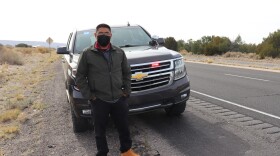SCOTT SIMON, HOST:
As with almost all kinds of other schooling, the pandemic has forced some classes in Indigenous languages to shut down entirely. But it has also spurred development of online options to reach students and to bring new ones into the fold. Among them, the Mountain West News Bureau's Savannah Maher.
SAVANNAH MAHER, BYLINE: It's a Wednesday evening in December. 5 p.m. means the end of my workday and the start of Wampanoag language class.
(SOUNDBITE OF DOORBELL)
MAHER: (Non-English language spoken).
I'm Zooming in from my home in Albuquerque, N.M. Other students join us from our homelands in southeastern Massachusetts...
(SOUNDBITE OF DOORBELL)
UNIDENTIFIED PERSON #1: (Non-English language spoken).
MAHER: ...And from Boston, New York, West Virginia. After an opening prayer, we get to work.
UNIDENTIFIED PERSON #2: (Non-English language spoken).
MAHER: (Non-English language spoken).
UNIDENTIFIED PERSON #2: (Non-English language spoken).
MAHER: Like most Indigenous people in America, I live away from my tribal community. Until recently, that meant I'd given up the opportunity to learn Wopanaotaok (ph), the Wampanoag language.
TRACY KELLEY: I didn't realize how many students want to come and couldn't.
MAHER: Tracy Kelley is a linguist and a teacher with the Wopanaak Language Reclamation Project. She's long dreamed of creating online language learning resources.
KELLEY: But there wasn't complete community buy-in.
MAHER: The biggest hangup, she says, was that digitizing our language could make it vulnerable to exploitation. But then the pandemic hit.
KELLEY: It was kind of like the perfect green light. You know, I was like, OK, you're on. Good thing you've been working on this because we need stuff now.
MAHER: Kelley built a secure Wampanoag language learning website, and she uses it to guide and supplement virtual classes. But she says that hasn't increased accessibility for everyone. And other language teachers are facing the same challenge.
ROBERT HALL: It's not ideal.
MAHER: Robert Hall is a language teacher on the Blackfeet Nation in Montana.
HALL: We live in a place of a lot of poverty. A lot of people just don't have the technology suitable for online learning.
MAHER: So he broadcasts on the Rez radio station.
(SOUNDBITE OF ARCHIVED RECORDING)
HALL: What a morning, what a morning. (Speaking non-English language).
MAHER: And in addition to this, broadcast, Hall streams the show live on YouTube, and he posts video lessons to the site, complete with a cast of puppet characters who sing songs and tell Blackfeet stories.
HALL: It is important to admit and to accept that it needs to be entertaining.
(SOUNDBITE OF MUSIC)
HALL: (Singing in non-English language).
MAHER: Hall's videos have traveled far beyond his Rez, reaching far-flung Blackfeet across the U.S. and Canada. Minja Gaines and her daughter Danielle Urbina are grateful that their tribe has embraced virtual learning, too. They're citizens of the Acoma Pueblo, an hour west of Albuquerque, but they live on the East Coast.
DANIELLE URBINA: I think my mom was the one who saw the language class, and I was like, we have to do this.
MAHER: Her mom says even though she grew up in her tribal community, her older relatives didn't teach her the language. They were Indian boarding school survivors.
MINJA GAINES: So they weren't allowed to speak their language at the boarding school. So some of it got lost.
MAHER: The online class is helping to break that cycle of loss.
GAINES: I felt more like I knew who I was afterwards.
URBINA: Yeah, same. I think it means everything. It gives me the opportunity to carry on culture that maybe I wouldn't be able to just because of the lack of proximity.
MAHER: As for my language, Tracy Kelley says Wopanaotaok is only going to get more accessible.
KELLEY: I would love to have video games, computer games, you know, apps like you would see on a kid's tablet. Let's have those in Wampanoag, you know? I'm envision taking this way further.
MAHER: For NPR News, I'm Savannah Maher in Albuquerque. Transcript provided by NPR, Copyright NPR.

